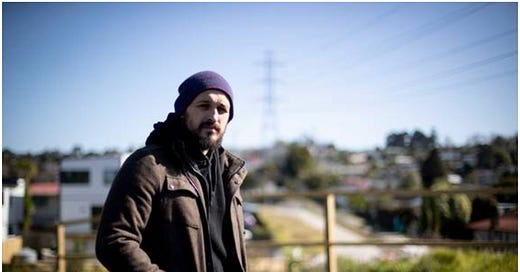Inequality and Crime: People Don't Realize How Hard Things Are / A.J. Hendry
Over the last few months we've been having a public conversation about crime, punishment and ultimately, what sort of society we want to build in Aotearoa. Recently, the conversation had moved from a focus on Ram Raids and Rangatahi, to a focus on gangs.
Political commentators and media personalities continue to call for harsher punishments and more police, and over the weekend the NZ National Party laid out a set of policies aimed at harassing and disrupting people associated with gangs.
And yet, beneath the hysteria we're seeing in our headlines, and the soundbite solutions being pumped out of political commentators, lies a reality that many of us are struggling to acknowledge.
A reality that extreme inequality is creating the environment in which crime and violence is an inevitability.
I was speaking to this point recently in an interview when one of the push backs I recieved was that surely we've done all we can do to address inequality and poverty, the question was asked, what more can we do?
As I've reflected on this, it strikes me that many people don't realize how hard some of our whānau are doing it currently.
Young people that I know personally who have been pulled into gangs, go there because they find acceptance, belonging, and a collective that is willing to help them survive. Calls to return to the land of "law abiding citizens" are calls to return to a society that has sent them the message that they are unwanted.
Some of these young people have been born into homelessness, suffered torture and abuse, lived their lives in and out of state systems, and have been told - time and time again - that they do not matter. Benefits keep people in poverty, many whānau struggling to have enough to give their own kids a good quality of life.
Housing is unaffordable, we have entire whānau living in motels, others cramming into small, poor quality homes. The situation is desperate, and successive governments have refused to do what is needed to urgently reduce inequality and provide for their needs. And now we wonder why some of our most structurally marginalized whānau are finding hope within gangs?
Surely this shouldn't surprise us?
If we want to address this problem we have to stop reacting to political sound bites and social media hysteria.
Instead we need to respond to what is actually going on in our community. Because whānau, we have not done enough to reduce inequality and eradicate poverty. If we had, we would have implemented a progressive tax system in order to share this nations wealth and ensure everyone had liveable incomes and access to decent housing.
We would be investing in services that would be designed to connect and heal our most marginalized and truamatized whānau. We would be ensuring that whānau from these communities had access to opportunities that raised their eyes and gave them hope for their future and for the future of their whānau.
The path Mark Mitchell, Chris Luxon and the National Party are seeking to lead this debate is a path that leads to escalating violence and obscures the real issues we need to be focusing on. These policies have been proven not to work.
Let's stop reacting, and start responding.
#EradicatePoverty
A.J. Hendry is a Laidlaw College graduate, and now a Youth Development Worker and housing advocate, working in the Youth Housing and Homelessness space. He leads a service supporting rangatahi experiencing homelessness and is also an advocate working collectively to end youth homelessness in Aotearoa. He is also the curator and creator of When Lambs Are Silent.
Though we try to keep up with all our comment’s and feedback, we do sometimes struggle to monitor all platforms. If you do want to engage in the conversation join us on facebook and find the relevant post or connect directly with A.J on his facebook page here.




